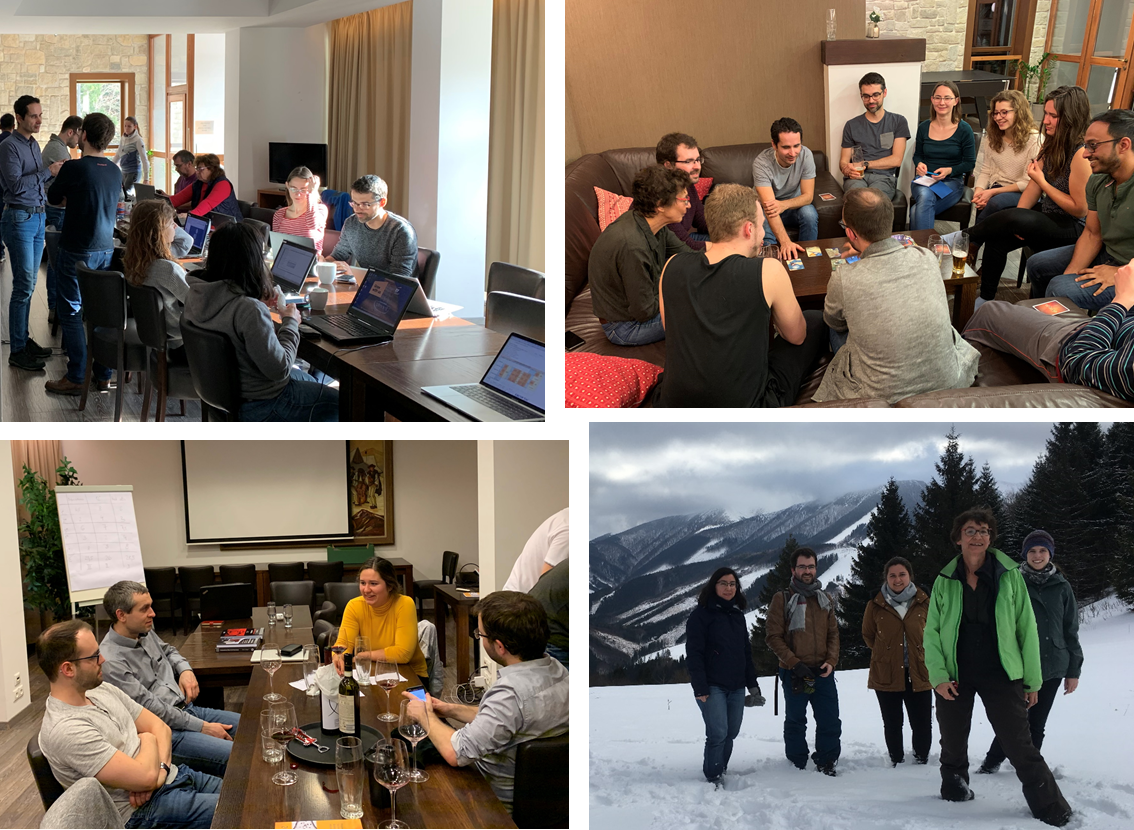Report on SIG37 workshop
3rd Workshop on Modelling of Biological Cells, Fluid Flow and Microfluidics 2020
Our workshop was organized from 9-13 February 2020, it was located in Hotel Rozsutec in Vratna, Slovakia. There were 22 participants – students and researchers from universities and research centers from Austria, France, Germany, Portugal, Slovakia and Turkey.
During the workshop, 6 lectures were given by invited speakers or their colleagues, one external lecture was given via teleconference and 10 lectures were given by other participants. The topic of all the lectures was the current state of art in microfluidics or blood flow modelling. The talks covered both laboratory and numerical experiment areas with application of various techniques, such as the use of magnetism, neural networks, and others.
The two hands-on sessions, held on Monday and Tuesday morning, were held in order to improve the numerical skills of young researchers. The goal was to show how the simulation package ESPResSo can be used to design numerical simulations of blood cells. During these sessions the participants were shown how to set and run their own simulation with a cell in a simple microfluidic channel.
The full titles of the talks:

- Sabine Alebrand, Michael Baßler: Particle equilibrium velocity in microfluidic flows: From experimental investigations to applications
- Hynek Bachratý, Katarína Jasenčáková, Katarína Bachratá: Perspectives of using deep neural networks in the simulation of blood flow in microfluidic devices
- Alžbeta Bohiniková: Understanding data from biological experiments
- Alžbeta Bugáňová: Dean's vortex and a special geometry of the channel
- Ivan Cimrák: PyOIF: Recent advancements and future directions
- Zunmin Zhang, Wei Chien, Stefan H. Holm, Ewan Henry, Jason P. Beech, Jonas O. Tegenfeldt, Gerhard Gompper, Dmitry A. Fedosov: Analysis of cells in microfluidics
- Markus Gusenbauer, Thomas Schrefl: Bridging the gap between biomedical applications and material sciences
- František Kajánek: Red blood cell tracking evaluation
- Kristína Kovalčíková: Creation of atypic-shaped obstacles in ESPResSo
- Timm Krüger, Qi Zhou, Lowell Edgar, Romain Enjalbert, Peter Hoskins, Miguel Bernabeu: Challenges of cellular blood flow simulations for reduced-order models
- Simon Mendez: Models for red blood cells under flow: From the fundamentals of red blood cell dynamics to hematology measurements
Inês Gonçalves, Cristiana Caldeira, Ana S. Moita, Rui Lima, António L. N. Moreira: Predicting cell deformability behaviour from analogue fluids in microfluidic devices - Dominik Medvecký, Adam Mračko, Michal Mulík, Lívia Sluková: Different possibilities of visualization of simulation results
- Achuth N. Balachandran Nair, Stefan Pirker, Mahdi Saeedipour: Modelling red blood cell dynamics using CFD-DEM coupling
- Felix Reichel, Lucas Wittwer, Marta Urbanska, Shada Abuhattum, Sebastian Aland, Jochen Guck: High-throughput characterization of the time-dependent mechanical properties of hydrogel beads, liquid droplets and biological cells
- Annie Viallat: Red blood cells in splenic slits and white blood cells in lung capillaries
- Esra Yilmaz, H. Cumhur Tekin: Modeling of magnetic levitation based microfluidic cell sorting system
The short abstracts from the talks were published in the book of abstracts, that was distributed to the participants of the workshop: https://www.amazon.com/Proceedings-Workshop-Modelling-Biological-Microfluidics/dp/1653079592/
The workshop was an interesting place to meet the scientists from the field of microfluidics, to discuss the problems that we encounter in our research, and to develop possible further collaborations. We would like to express our thanks to the ERCOFTAC section SIG37 for supporting the workshop.
